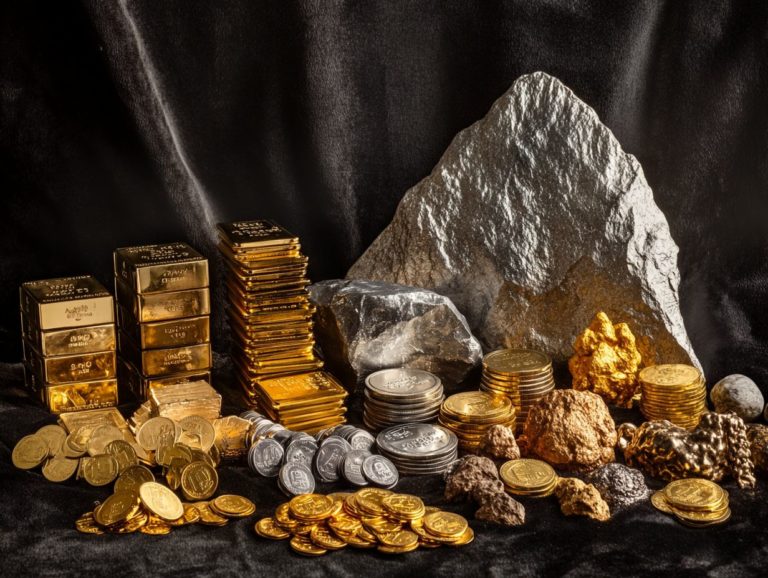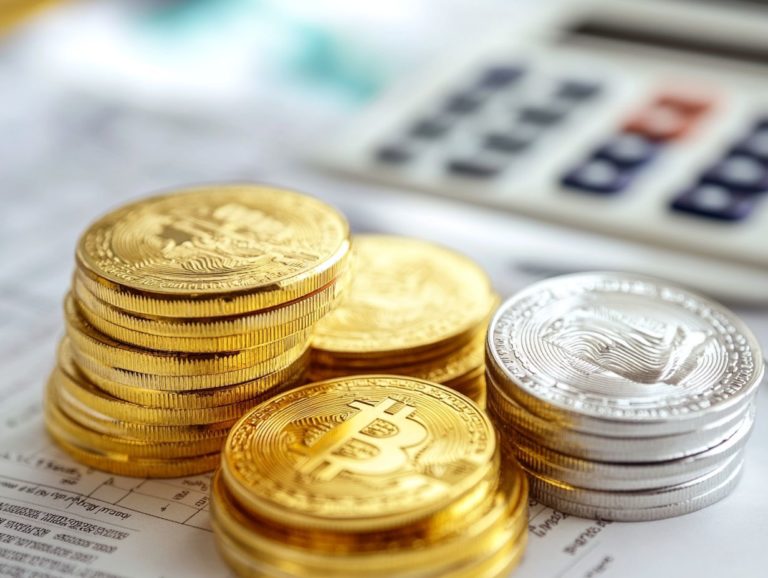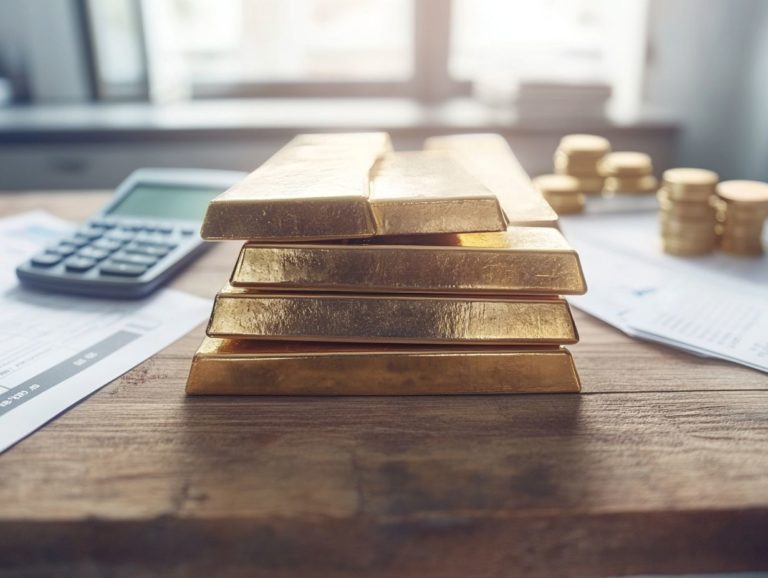The Impact of Geopolitics on Gold Prices
Geopolitics holds significant sway over financial markets, especially in influencing gold prices.
This article looks at the intricate relationship between global political dynamics and gold s value. It traces historical trends and pivotal events that have shaped its market fluctuations.
Current geopolitical tensions and economic uncertainties are intensifying demand. There is a growing need for strategic investment in these turbulent times.
You will find predictions on how these factors may influence gold prices. Whether you re an investor or simply intrigued by the connection between politics and precious metals, this discussion offers crucial insights to help you navigate these changes.
Contents
- Key Takeaways:
- Defining Geopolitics and Its Influence on Markets
- Historical Relationship between Geopolitics and Gold Prices
- Current Geopolitical Factors Affecting Gold Prices
- How Geopolitics Can Impact Gold Prices
- Strategies for Investing in Gold during Geopolitical Uncertainty
- Frequently Asked Questions
- What is the relationship between geopolitics and gold prices?
- How do economic sanctions affect the price of gold?
- What role does political stability play in gold prices?
- How does trade policy impact the price of gold?
- Do geopolitical events have a long-term impact on gold prices?
- Are there other factors besides geopolitics that affect gold prices?
Key Takeaways:
- Geopolitics has a significant impact on the volatility of gold prices.
- Historical events and current geopolitical factors, such as global tensions and economic uncertainty, drive both demand and supply for gold.
- Experts recommend investing in gold as a safe-haven asset during times of geopolitical uncertainty.
- Diversification and risk management strategies should also be considered.
Defining Geopolitics and Its Influence on Markets
Geopolitics significantly shapes financial markets, directly influencing your investment behavior and asset prices.
Gold, often viewed as a safe-haven asset, tends to shine in times of geopolitical tension and uncertainty. The ongoing Russia-Ukraine conflict, compounded by escalating trade wars and economic sanctions, creates a complex dynamic that impacts central bank purchasing and investor flows.
This interaction drives volatility in the global economy and, in turn, affects gold returns. As you navigate these waters, keep an eye on pivotal dates like August 2024 and October 2023; they may hold considerable significance for your investment strategy.
Historical Relationship between Geopolitics and Gold Prices
The historical connection between geopolitical tensions and gold prices unveils a clear pattern: as conflicts escalate and political instability rises, the demand for gold tends to soar. This positions gold as a dependable barometer for financial markets during uncertain times.
Consider pivotal events like the Gulf War, the harrowing attacks of 9/11, and the 2015 Paris attacks. These crises have consistently nudged investors toward gold, solidifying its status as a safe-haven asset and enhancing its value during periods of turmoil.
Key Events and Trends
Key events, such as the 2008 financial crisis and ongoing tensions between Russia and Ukraine, have profoundly influenced gold prices. You ll notice a consistent trend: conflicts often lead investors to gravitate toward gold as a safe-haven asset.
This interaction between geopolitical events and financial markets underscores the necessity of grasping how these landscapes affect investor sentiment. Take the 2008 crisis as a prime example; gold prices skyrocketed by over 25%, hitting historical highs as investors sought refuge amidst plummeting stock values.
Similarly, the recent escalations in Eastern Europe have prompted sharp climbs in gold prices, often mirroring fluctuations in global equities. Research indicates that during times of crisis, around 70% of investors turn to gold, significantly boosting its demand and reinforcing its position as a hedge against market volatility.
This data highlights the psychological factors at play. During periods of instability, the instinct for security drives investors toward tangible assets like gold, providing deeper insights into market behaviors and trends.
Current Geopolitical Factors Affecting Gold Prices
Current geopolitical dynamics, including rising tensions in Ukraine, economic sanctions on Russia, and shifting trade relations with China, are significantly impacting gold prices. This reflects a global economy that is navigating uncertainty and volatility.
In this context, investors are increasingly viewing gold as a vital strategy for protecting their assets amidst market fluctuations. This highlights why you must consider gold in your strategy to secure your financial future.
Global Tensions and Economic Uncertainty
Global tensions and economic uncertainty are closely connected, often triggering a notable rise in gold prices as you seek safety amid market turmoil.
Geopolitical conflicts, such as the ongoing Russia-Ukraine situation and various trade disputes, drive substantial investor interest in gold. This, in turn, influences the purchasing strategies of central banks and reshapes the financial markets.
During volatile times, individuals and institutions seek this reliable asset to protect against potential losses in equities and currencies. The allure of gold becomes even more pronounced when inflation rates rise and economic forecasts grow uncertain.
Central banks, which are institutions that manage a country’s currency and monetary policy, frequently revise their reserves. They increase their gold holdings to fortify their portfolios. This shift shows a rising confidence in gold, making it an exciting investment!
As demand rises, so do prices, creating a cyclical effect that reinforces gold’s status as a secure store of value.
How Geopolitics Can Impact Gold Prices
Geopolitical risk plays a crucial role in shaping gold prices. Heightened tensions frequently trigger notable shifts in the supply and demand dynamics of the gold market.
When uncertainty looms, investors tend to flock to gold as a safeguard against inflation, resulting in increased market volatility. This surge in interest drives prices higher, reinforcing gold’s reputation as a pivotal asset for financial stability.
Supply and Demand Dynamics
The dynamics of supply and demand play a pivotal role in shaping gold prices, especially during geopolitical tension. When uncertainty looms, there is often an uptick in demand for gold, driving prices higher.
This relationship highlights how external factors, like political instability and economic sanctions, can lead to significant fluctuations in the gold market. For instance, during periods of intense conflict or diplomatic crises, investors typically rush to gold as a safe-haven asset.
This rush can create demand that frequently surpasses supply. Recent events, such as escalating tensions in Eastern Europe, have illustrated this behavior, with market observers noting substantial rallies in gold prices amid concerns about broader economic repercussions.
When countries impose trade restrictions or sanctions, the perceived risk intensifies. This prompts traders to seek gold as a hedge against currency depreciation and inflation. These patterns not only reveal the immediate impact of geopolitical developments on gold prices but also underscore the necessity of staying vigilant about global events to understand market trends effectively.
Strategies for Investing in Gold during Geopolitical Uncertainty
Investing in gold amid geopolitical uncertainty calls for a strategic approach that capitalizes on its reputation as a safe-haven asset.
Consider the current market conditions and the potential for inflation hedging. By grasping the nuances of market volatility and investor sentiment, you can make informed decisions that align with your financial goals.
Expert Insights and Tips
Expert insights on gold investment highlight that navigating geopolitical factors requires a keen understanding of market volatility and a proactive approach to asset allocation.
Seasoned investors emphasize that timing and diversification are crucial for capitalizing on gold s dependable performance during uncertain times.
In this ever-evolving financial landscape, it s essential to remain vigilant, continuously monitoring global events that can sway gold prices. Staying informed about central bank policies and interest rates is vital, as these factors can significantly influence gold’s appeal and value.
Incorporating gold into your portfolio as a hedge against inflation and economic downturns is a smart move. Experts suggest maintaining a balanced mix that includes both physical gold and gold-related securities.
By following these strategies, you can effectively navigate challenges and optimize your investment returns in a shifting geopolitical backdrop. Stay updated and consider investing in gold today!
Predictions for Future Geopolitical Influence on Gold Prices
Future predictions for gold prices are closely linked with the changing landscape of geopolitical risks. As tensions rise and new conflicts arise, these factors are likely to influence market dynamics.
Understanding these risks is crucial for investors navigating the gold market in the coming years.
Experts use advanced tools to forecast how shifts in global politics like trade disputes and military actions can trigger price changes. Historical trends show that instability often drives up demand for gold as a safe investment.
By examining various scenarios, from sanctions to regional conflicts, you can prepare for possible market changes.
Engaging with these predictions helps you make informed decisions. Position yourself wisely amid the ever-evolving geopolitical landscape.
Frequently Asked Questions
What is the relationship between geopolitics and gold prices?
Geopolitical events can greatly affect gold prices. Gold is often viewed as a safe asset during political uncertainty, which boosts demand and prices.
How do economic sanctions affect the price of gold?
Sanctions can limit gold supply, driving up prices. When facing sanctions, countries may see their currencies weaken, making gold a more attractive investment.
What role does political stability play in gold prices?
Political stability significantly influences gold prices. Instability often pushes investors toward gold, increasing demand and prices.
How does trade policy impact the price of gold?
Changes in trade policies, like tariffs, can shake up the global economy and affect gold prices. Uncertainty in trade can lead investors to seek gold, raising demand and prices.
Do geopolitical events have a long-term impact on gold prices?
Yes, geopolitical events can cause both short-term and long-term price changes. Political tensions or sanctions can lead to immediate fluctuations, while ongoing geopolitical factors can shape long-term trends.
Are there other factors besides geopolitics that affect gold prices?
Certainly! Economic conditions, interest rates, and the strength of the US dollar also play critical roles. These elements can interact with geopolitical events to influence gold prices.





